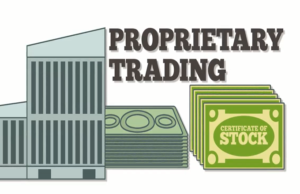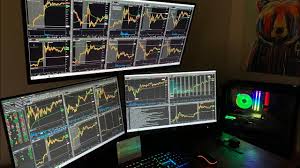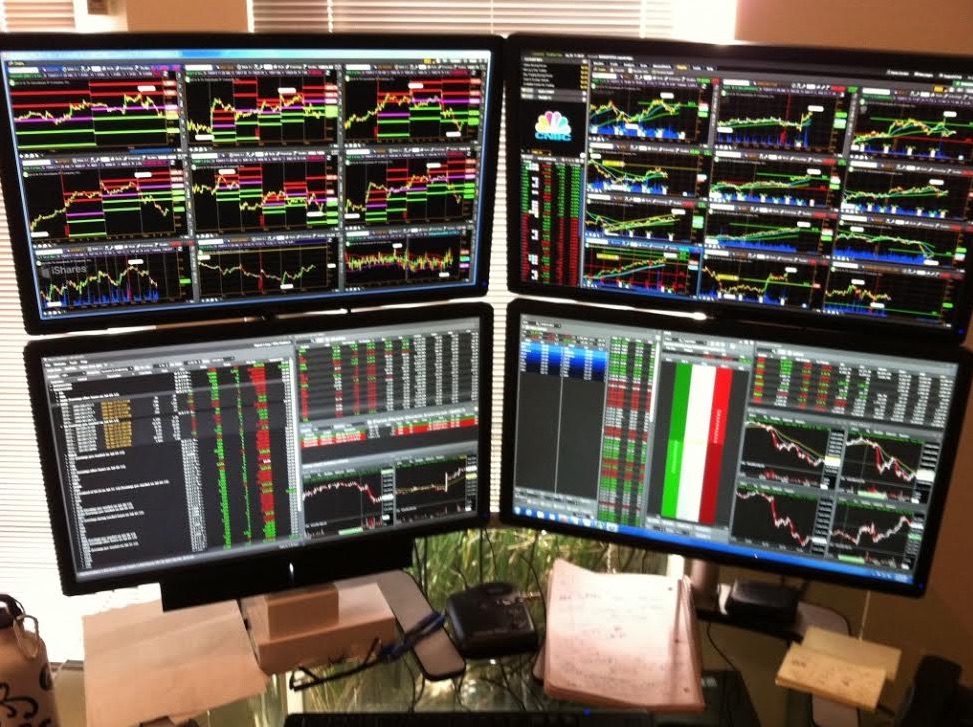What is Proprietary Trading?
In this post we will look at what proprietary trading is. Very simply, its like having an office of traders that would have employees like you and I coming in to trade. We work remotely and trade our own strategies. Let’s see how, in the simplest of terms.
The Basics of Proprietary Trading
 A Proprietary Trading Firm basically says: “Hey, you know what? If you’re really good, you can come and trade my money. Let me see if you’re any good first. So then I have some criteria.” Perhaps you’ve got to go through their own training program and be the best ones of the training program. On the prop firm (proprietary trading firm) side of it is where they want to see how well you’ve been doing, how much money you’ve been making, and what your strategy is before they say… “I want to speak to you!”
A Proprietary Trading Firm basically says: “Hey, you know what? If you’re really good, you can come and trade my money. Let me see if you’re any good first. So then I have some criteria.” Perhaps you’ve got to go through their own training program and be the best ones of the training program. On the prop firm (proprietary trading firm) side of it is where they want to see how well you’ve been doing, how much money you’ve been making, and what your strategy is before they say… “I want to speak to you!”
They basically want to see that you could make them some money. That’s the business they’re in so the deal is basically how much you know and how well you can trade. Can you can make me some money? If so, I’ll give you more money to trade with just like a business, would invest in another business and then say: “Hey, I like your business model, here’s some money. I’m expecting to get a return on that money. You haven’t got the money at the moment but you’ve got the skill. We’ve got a deal.”
Trading With Other People’s Money
This that’s kind of what a prop trading firm does. So, you might go to a prop trading firm and they might say: “Okay, do you know what you know? We are going to give you a bankroll of $200,000.”
Why wouldn’t you do it? Of corse you would! Well, it’s two hundred thousand and they give you daily risk parameters to start off with so you can have a maximum position. It depends on what you’re trading.
Some people are trading out rights like crude oil, gold or or other things. Some people trade currency pairs (Forex), crypto or even stocks. It doesn’t really matter. The point is, there are going to be some parameters put in place for you and that’s the deal that you’re going to have presented to you. They will have rules and say: “Hey, do you want trade our money? There’s going to be a cap on the risk. There’s going to be a cap on the position size. There will be other rules, too.”
So it’s just common business sense because they don’t want to be exposed to too much risk. They often won’t allow you to keep trades open overnight or over a weekend just to protect their money.
 Even though they’re saying to you’ve got two hundred thousand, really that number is meaningless. It could be 200 million. It’s all about managing risk. If you can manage $200,000 then you can manage other amounts. Then what the most important number is, how much you’re out (drawdown) showing your risk.
Even though they’re saying to you’ve got two hundred thousand, really that number is meaningless. It could be 200 million. It’s all about managing risk. If you can manage $200,000 then you can manage other amounts. Then what the most important number is, how much you’re out (drawdown) showing your risk.
Proprietary Trading Firms Profit Split
There will be a profit split between you and the prop firm. That’s how they make money. The most common is 80/20. So, in other words you get to keep 80 percent of their profits and they get to keep 20 percent of the profits. Generally speaking, in a prop trading environment, they are going to swallow the loss but their is some point that they’re not going to.
To take you on board and so they know that you’re a good bet, they’ll be doing all their due diligence on you. They’re checking your strategy. Checking the weaknesses in your strategy. Interviewing you doing all that kind of stuff. Ultimately, at any point they can just pull the plug and say it’s not working. We’re going to have to move on now.
Growing Your Account
A good prop deal will will get better and better with time and they’ll encourage you to trade more. This is called scaling. This is a good thing about the prop firm environment and they’ve got the funds there and they will encourage you to trade more.
Think of them saying: “You’re doing very, very well! You’ve made a bit of money. We’ve made some money. Would you trade more aggressively or with more money?” They’ll do reviews regularly on you and give you more size and more leverage to play with and hopefully increase the profitability of both. It’s your job as a prop trader. If you’re doing well, your profit split may also increase to, say, 90/10.
You know this is all negotiable. Like any business deal, it’s all very, very negotiable, depending on your skill and depending on who you’re working with. “I know how valuable you are, what you’re bringing to the table.” If you’re making good consistent money for the prop firm they’re going to give you more and more funds and maybe more and more risk to play with. This may come with more and more training, hopefully to improve your skill level, a more and more slice of the pie.
So that’s pretty much how it will work.
Why Does the Proprietary Trading Firm Get a Cut?
 One thing to note is that you’re also going to have what’s called desk fees or have some fixed fees to pay. Imagine if you’re trading in the office. You’ll have to pay for having that workstation, for having all the feeds that you need, the market feeds, and you’ll have to pay that to the prop trading company each month as well. So you have to pay that and then you have a high watermark point.
One thing to note is that you’re also going to have what’s called desk fees or have some fixed fees to pay. Imagine if you’re trading in the office. You’ll have to pay for having that workstation, for having all the feeds that you need, the market feeds, and you’ll have to pay that to the prop trading company each month as well. So you have to pay that and then you have a high watermark point.
So, let’s say your account balance is at 200,000. Let’s also say at the end of the month your account increases to two hundred twenty thousand dollars due to your trading efforts. So, that’s when the profit split happens.
Assuming it’s an 80/20 split, at 80% of twenty thousand dollar profit, you get $16,000. That’s your portion for the month. Twenty percent of $20,000 is $4,000 and this is the prop firm’s portion for the month.
Don’t Withdraw All of Your Profits Every Month
However, if you were to redeem all profits in one month, you’re now reset at a higher amount like $200,000 or $220,000 whatever the number may be after taking your money out. There’ll be a high-water mark so the next month to get paid you’ve got to get above that high-watermark.
You can’t just make a little bit and then take it all out or you won’t be able to take any kind of a loss. You’ll go into drawdown and you won’t be paid. Obviously, if you lose two months in a row, you’re not repaid until you’ve gone back up into profitability. If you lose too much, you’ll lose your account – no questions asked.
How to Make Money in Proprietary Trading
So it’s all about the raw numbers. At the end of day, if you’re, making money, you’re going to get a good slice of it. If you’re losing money, they’re going to swallow it up to a certain point and after that point you’ll lose your account.
Some times you could make a couple hundred grand in a quarter, or whatever it may be, and then you have a bit of a down period. It may be that market conditions may have changed due to many reasons out of your control, like pandemics and wars. If things start picking up a bit and then you’ll kind of tread water for a little bit not making much. Maybe you’ll make a little bit, maybe lose a little bit, then you’ll start picking up and get back on track.
 So that’s really how the prop trading model works and they’ll have a group of people all doing this trading. Each may use similar strategies or will be making different strategies. All traders have their own little business in their own right and making themselves and the prop firm money. The prop firm is providing the risk capital.
So that’s really how the prop trading model works and they’ll have a group of people all doing this trading. Each may use similar strategies or will be making different strategies. All traders have their own little business in their own right and making themselves and the prop firm money. The prop firm is providing the risk capital.
In a perfect world, these traders are providing the skill and are being rewarded with a percentage of the profits. The prop firm is also benefiting financially while also providing the infrastructure to trade from and the capital that is being traded. It’s a win-win situation.
Take Advantage of Educational Resources
A lot of prop trading firms will have educational programs that you will want to take advantage of. Many of these resources are free as is information you can find on YouTube and other sites. You can also pay for courses, with the prop firm or elsewhere. In a good course, they will run you through direct assistance and the winning strategies they use.
So, at the end of it, you are trading on a demo or perhaps with a small, live account. Those who show the very best promise will be able to switch up to a larger account with maybe a better profit split. They’re going to start you off very small at first because they need to make sure they’re not risking too much. The main way to do this is to start with a demo account. Once you can reliably pass demos, then you may be ready for a live challenge.
Here’s a short video on this topic:
Conclusion
Proprietary trading can be very lucrative but can and will take time and patience to learn. It can take years to become a profitable trader. Keep working on your strategies on demo accounts that cost nothing. Do not spend or risk unnecessarily.
My favourite prop firms:
- Funded Trading Plus (Use Coupon Code DAR10 for 10% off)
- E8 Funding (Use Coupon Code REB8 for 8% off)
- MFF
- FTMO
If you like this post and would like to be notified of new posts, subscribe in the top right of this page. Please rate, share and comment!
Check out a related article I wrote here: What Is A Prop Firm? Simplest Explanation
Related Posts

Technical Analysis: 4 Stocks with signs of death crossovers to keep an eye on

HDFC Bank & 3 other fundamentally strong stocks trading above 200 DMA to keep an eye on

Falling Channel Breakout: Multibagger NBFC Stock Shows Bullish Momentum on Daily Chart

4 Fundamentally strong stocks to buy for an upside potential of up to 36%; Do you hold any?

